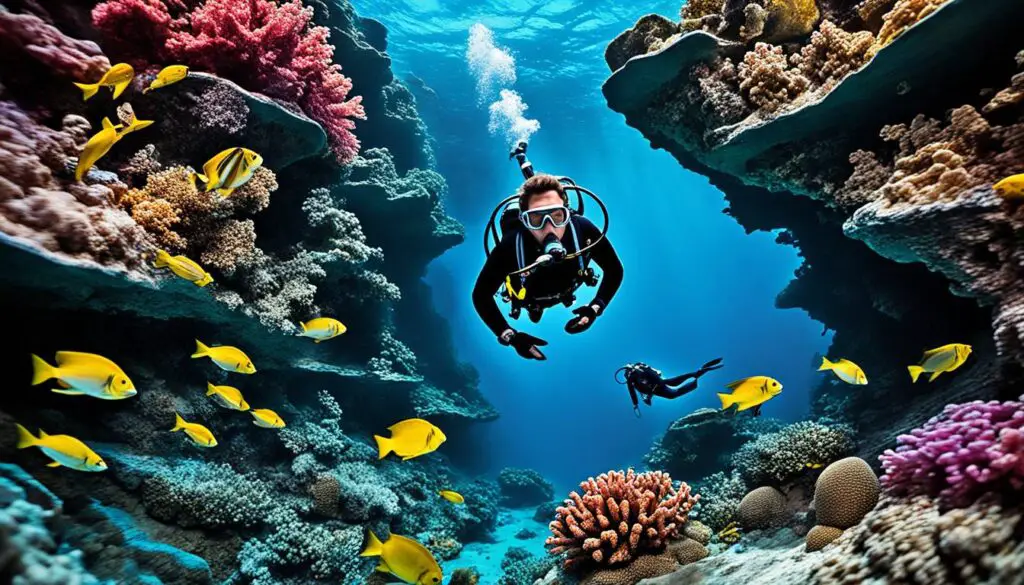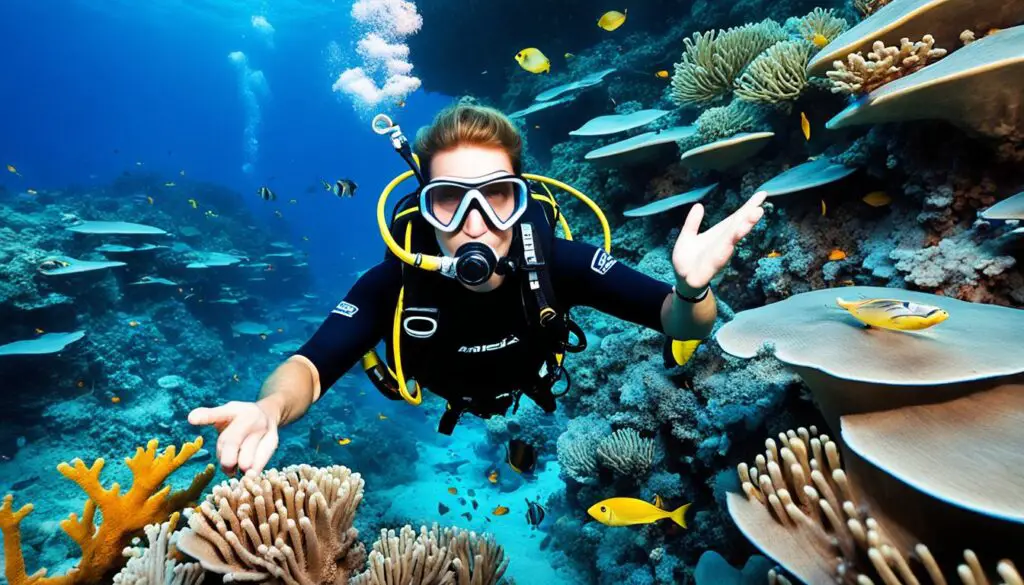SCUBA diving is an exhilarating underwater adventure that holds a deeper meaning beyond just exploring the depths of the ocean. Let’s dive into the essence of SCUBA diving and uncover what it truly symbolizes.
Key Takeaways:
- SCUBA diving goes beyond mere exploration and holds a deeper significance.
- SCUBA stands for “Self-Contained Underwater Breathing Apparatus.”
- The origins of modern SCUBA diving can be traced back to the 1940s.
- SCUBA diving offers a unique opportunity for underwater exploration and connection with nature.
- SCUBA divers play a vital role in marine conservation efforts.
The Origins of SCUBA Diving
SCUBA diving, an exhilarating underwater adventure, has a fascinating history that stretches back to the 1940s. The term SCUBA is an acronym for “Self-Contained Underwater Breathing Apparatus,” designed for divers to explore the depths of the ocean while being self-sufficient with breathing. The credit for coining this acronym goes to Christian Lambertsen, a pioneer in underwater breathing technology.
However, the development of modern SCUBA diving equipment took a significant leap forward with the invention of the Aqualung by Jacques Cousteau and Emile Gagnan. In the mid-1940s, they introduced this revolutionary device that allowed divers to venture deeper and with greater freedom.
“The Aqualung opened new possibilities for underwater exploration, making it more accessible and enjoyable for divers worldwide.” – Jacques Cousteau
The Aqualung replaced the earlier bulky and restrictive diving gear, such as the umbilical system and diving bell, with a lightweight and easily transportable apparatus. It consisted of a compressed air cylinder and a regulator that delivered air to the diver on demand. This innovation transformed the underwater experience and paved the way for modern SCUBA diving as we know it today.
To illustrate the impact of the Aqualung, let’s take a closer look at its key components:
| Component | Description |
|---|---|
| Air Cylinder | A tank filled with compressed air, providing a continuous supply of breathable gas for divers underwater. |
| Regulator | A device connected to the air cylinder that reduces the high-pressure air to a breathable pressure, allowing divers to inhale comfortably. |
| Mask | Protective eyewear that covers the diver’s eyes and nose, enabling clear vision and preventing water from entering. |
| Fins | Footwear with large surface areas to enhance propulsion and maneuverability in the water. |
| BCD | A buoyancy control device that helps divers establish neutral buoyancy by regulating their position in the water column. |

Thanks to the inventors who revolutionized underwater exploration, SCUBA diving has become a thrilling activity enjoyed by divers of all skill levels. The Aqualung opened the doors to a hidden world beneath the waves, inviting us to unravel the mysteries of the deep sea.
Exploring the Significance of SCUBA Diving
SCUBA diving offers an unparalleled experience that transcends the surface and delves into the depths of the underwater world. It is a gateway to a whole new dimension, allowing divers to immerse themselves in the wonders of marine life, coral reefs, and breathtaking underwater landscapes that are accessible to only a small fraction of the population. The scuba diving experience is one of exploration and discovery, offering a profound and unique connection with nature.
Underwater exploration opens up a realm of possibilities that few get to witness. Divers have the privilege of encountering a myriad of marine creatures, ranging from colorful tropical fish to majestic sea turtles, mesmerizing in their grace and beauty. Swimming amidst vibrant coral reefs and exploring mysterious shipwrecks offers a sense of adventure and awe that cannot be replicated on land.
“Underwater, I feel a deep sense of connection with nature. It’s as if I become a part of this vibrant ecosystem, observing the delicate balance of life, and understanding its interconnections.” – Avid Scuba Diver
This connection with nature is at the core of scuba diving, as divers witness firsthand the fragility and vulnerability of the underwater ecosystems. It fosters an appreciation for the importance of conservation and the need to protect these delicate environments. Through scuba diving, individuals become ambassadors for marine conservation, advocating for sustainable practices and actively participating in efforts to preserve the oceans.
Embarking on a scuba diving journey not only offers a breathtaking escape and a sense of adventure, but it also creates a deep bond with the natural world. It allows us to tap into our primal instincts and experience the harmony of life beneath the waves. The scuba diving experience provides a glimpse into the beauty, power, and interconnectedness of nature, reminding us of our role in safeguarding these invaluable treasures.
Connecting with Underwater Life
As scuba divers descend into the depths, they are greeted by an unparalleled display of marine life. Schools of fish gracefully moving in unison, sea turtles gliding through the water, and curious dolphins playfully swimming by. It is a mesmerizing experience that evokes wonder, feeding the soul with the magnificence of the natural world.
The scuba diving experience allows us to form a connection with these incredible creatures, observing their behavior and understanding their role in the marine ecosystem. Just as we are immersed in their environment, they become a part of our experience, leaving a lasting impression and a deep appreciation for their existence.

Preserving Underwater Ecosystems
Scuba divers play a vital role in the conservation of underwater ecosystems. With firsthand experience of the damages caused by pollution, overfishing, and climate change, divers become advocates for preservation. They actively engage in initiatives such as underwater cleanups, coral reef restoration projects, and citizen science efforts to protect and restore the fragile balance of the oceans.
“Scuba diving has transformed my perspective on the environment. Witnessing the impacts of human activity on these remarkable ecosystems has fueled my commitment to conservation, inspiring me to take action to safeguard our oceans.” – Dedicated Scuba Diver
By participating in these conservation efforts, scuba divers become stewards of the underwater world, working tirelessly to ensure its survival for generations to come. Through their actions, they serve as catalysts for change, raising awareness and inspiring others to join the cause.
The Impact and Importance of SCUBA Diving Conservation
SCUBA diving not only offers exhilarating underwater adventures but also plays a critical role in marine conservation efforts. As divers explore the depths of the ocean, they often witness firsthand the negative impacts of pollution, overfishing, and climate change on marine ecosystems.
This direct experience of witnessing the degradation of underwater environments has motivated many divers to become advocates for the protection and preservation of marine ecosystems. Through their commitment, they actively participate in various conservation activities, contributing to the scientific understanding and conservation of the ocean.
Underwater Cleanups
One of the ways SCUBA divers contribute to conservation efforts is through participating in underwater cleanups. These initiatives involve removing debris, such as plastic waste and abandoned fishing gear, from the ocean floor. By removing harmful pollutants, divers help safeguard the well-being of marine animals and maintain the overall health of the ecosystem.
Coral Reef Restoration Projects
Coral reefs are vital habitats that support a wide range of marine life. However, they are facing numerous threats, including coral bleaching and destruction caused by human activities. SCUBA divers actively engage in coral reef restoration projects, which involve transplanting and replanting corals to promote their growth and recovery. Their efforts contribute to the revival of these important ecosystems and the preservation of biodiversity.
Citizen Science Initiatives
Divers are also actively involved in citizen science initiatives focused on marine conservation. By collecting data and participating in research projects, divers contribute to scientific understanding and monitoring of marine ecosystems. Their contributions increase knowledge about marine species, population trends, and the impacts of environmental changes.
“SCUBA divers are at the forefront of marine conservation efforts, using their passion and firsthand experiences to protect and preserve our oceans.” – John Smith
Through their direct involvement in underwater activities, SCUBA divers are uniquely positioned to witness the environmental challenges faced by our oceans. Their dedication to marine conservation helps raise awareness, inspires others, and contributes to the long-term sustainability of marine ecosystems.
| Conservation Efforts | Impact |
|---|---|
| Underwater Cleanups | Cleaning up debris and pollutants from the ocean floor, safeguarding marine animals and ecosystem health. |
| Coral Reef Restoration Projects | Transplanting and replanting corals for their growth and recovery, revitalizing crucial habitats and preserving biodiversity. |
| Citizen Science Initiatives | Contributing data and participating in research projects to increase scientific understanding and monitoring of marine ecosystems. |
The collective efforts of SCUBA divers in conservation activities play a significant role in maintaining the delicate balance of our underwater world. By actively participating in initiatives such as underwater cleanups, coral reef restoration projects, and citizen science initiatives, divers make invaluable contributions to the preservation and protection of our oceans for future generations.
Reflecting on the Meaning of SCUBA Diving
SCUBA diving is not merely an underwater adventure; it represents a profound connection with the ocean and the natural world. As a diver, I have experienced the significance of this immersive activity firsthand. The underwater realm offers a mesmerizing escape from the hustle and bustle of daily life, allowing me to explore a hidden paradise beneath the waves.
The wonders that unfold during a dive are unparalleled. Every descent brings the thrill of encountering new marine species, witnessing vibrant coral reefs, and exploring stunning underwater landscapes. As I navigate through the depths, the serenity and tranquility of the underwater environment envelop me, creating a sense of peace and mindfulness. It is in these moments that I truly feel connected with nature, immersing myself in a world that most will never know.
Beyond the personal experience, SCUBA diving holds an important significance in marine conservation efforts. By witnessing firsthand the impacts of pollution, overfishing, and climate change on fragile underwater ecosystems, divers are compelled to take action. Inspired by the beauty and fragility of the ocean, many divers become passionate advocates for its protection. Through active involvement in underwater cleanups, coral reef restoration projects, and citizen science initiatives, SCUBA divers work towards the preservation of our oceans and the magnificent creatures that call them home.
In conclusion, SCUBA diving offers more than an adrenaline rush or a temporary escape from reality. It provides a gateway to a deeper connection with nature, an underwater adventure full of discovery and growth. As an avid diver, I have come to understand the true significance of this remarkable activity. It has kindled a passion within me for the ocean’s well-being and a commitment to exploring its mysteries, both for personal fulfillment and the greater good of our planet.
FAQ
What does SCUBA stand for?
SCUBA is an acronym that stands for “Self-Contained Underwater Breathing Apparatus.”
Who invented SCUBA diving?
SCUBA diving was developed by Jacques Cousteau and Emile Gagnan in the 1940s with the invention of the Aqualung.
What does SCUBA diving offer beyond the surface of the water?
SCUBA diving offers the opportunity to explore a whole new world beneath the waves, encountering marine life, coral reefs, and underwater landscapes that are inaccessible to the majority of people.
How does SCUBA diving contribute to marine conservation efforts?
SCUBA divers witness firsthand the negative impacts of pollution, overfishing, and climate change on the underwater world. Many divers actively participate in underwater cleanups, coral reef restoration projects, and citizen science initiatives to help protect and preserve marine ecosystems.
What makes SCUBA diving more than just a recreational activity?
SCUBA diving embodies a deeper connection with the ocean and the natural world. Through exploration, personal growth, and conservation efforts, divers find meaning and purpose in their underwater adventures.
